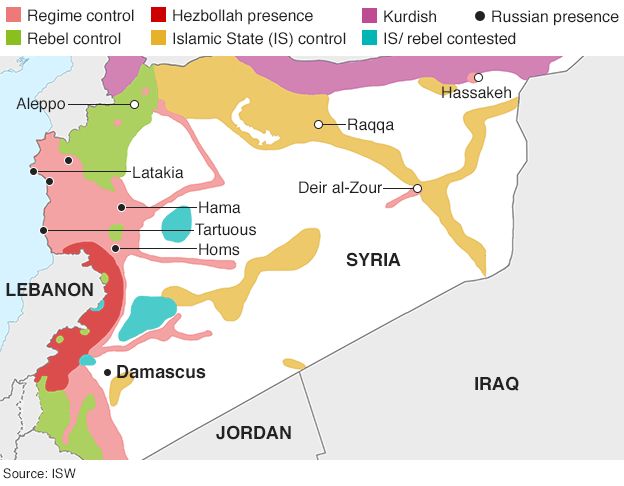President Vladimir Putin has defended Russia's military operations in Syria, saying the aim is to "stabilise the legitimate authority" of Syrian President Bashar al-Assad.
Mr Putin told Russian state TV Moscow also wanted to "create conditions for a political compromise" in Syria.
He denied that Russian air strikes were hitting moderate opposition groups rather than Islamic State militants.
Syrian forces are said to have made significant advances against rebels.
Government gains in Idlib, Hama and Latakia provinces were on Sunday reported both by Damascus and opposition activists.
The main battlefront is currently close to the key highway that links the capital with other major cities, including Aleppo, and Mr Assad's forces are believed to be seeking to cut off rebels in Idlib.
'Under siege'
In the interview with Rossiya One TV broadcast on Sunday, President Putin said Russia's aim was to "stabilise" the government in Damascus.
 Image copyrightAFP
Image copyrightAFP Image copyrightReuters
Image copyrightReutersHe stressed that without Moscow's support for President Assad there was a danger that "terrorist groups" could overrun Syria.
Mr Assad's government was currently "under siege", Mr Putin said, adding that militants were "at the edge of Damascus".
The Russian leader also urged other nations to "unite efforts against this evil (terrorism)".
The US-led coalition - which has been carrying out its own air strikes in Syria - earlier said it would not be co-operating with Russia.
Several countries - including the UK and Turkey - have described Russia's support for President Assad as a "mistake".
Russia said on Sunday its aircraft carried out more than 60 missions over Syria in the past 24 hours, and that IS was its main target.
Russia began its strikes on 30 September.
Analysis: Jim Muir, BBC News, Beirut
Government forces are basically trying to win back areas they lost earlier this year, to the north of the city of Hama, and in the northern mountains of Latakia province near the coast. Rebels had penetrated there after unifying their ranks and with more concerted backing from their outside supporters, Turkey, Saudi Arabia and Qatar.
That posed a real threat to the heartland of Bashar al-Assad's regime, and it is almost certainly what triggered the Russian intervention and a stepped-up role by Iran.
A senior commander of the al-Nusra Front, the al-Qaeda affiliate which has forces in the area, has issued a call to all the rebel groups to unify and launch a co-ordinated counter-attack on all fronts.
He said if the rebels lost the initiative to the regime and the Russians, they would suffer a series of collapses and their future would be bleak.
The battle for Syria and Iraq in maps
Syria's civil war

Why is there a war in Syria?
Anti-government protests developed into a civil war that four years on has ground to a stalemate, with the Assad government, Islamic State, an array of Syrian rebels and Kurdish fighters all holding territory.
Who is fighting whom?
Government forces concentrated in Damascus and the centre and west of Syria are fighting the jihadists of Islamic State and Jabhat al-Nusra, as well as less numerous so-called "moderate" rebel groups, who are strongest in the north and east. These groups are also battling each other.
What's the human cost?
More than 250,000 Syrians have been killed and a million injured. Some 11 million others have been forced from their homes, of whom four million have fled abroad - including growing numbers who are making the dangerous journey to Europe.
How has the world reacted?
Iran, Russia and Lebanon's Hezbollah movement are propping up the Alawite-led Assad government, while Turkey, Saudi Arabia and Qatar back the more moderate Sunni-dominated opposition, along with the US, UK and France. Hezbollah and Iran are believed to have troops and officers on the ground, while a Western-led coalition and Russia are carrying out air strikes.



